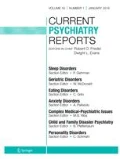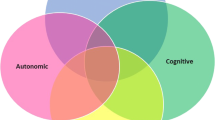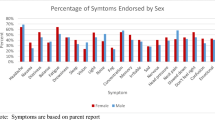Abstract
Purpose of Review
The purpose of this study was to review the frequency, risk factors, phenomenology, and course of prolonged recovery from concussion and of psychiatric sequelae in pediatric populations.
Recent Findings
Youth with prolonged recovery from concussions have higher initial symptoms, a history of multiple and/or recent concussions, and a tendency to somatization. Depression, post-traumatic stress disorder, behavioral disorders, and perhaps, suicidal behavior disorder are more common as both short- and longer-term sequelae of concussions. The weight of evidence supports a graduated return to function as compared to prolonged rest, which may actually impede recovery. For those with prolonged recovery, cognitive behavior therapy aimed at education about concussions, improving coping, problem-solving, sleep hygiene, and dealing with anxiety and depression provided in a collaborative care model is superior to usual care.
Summary
Concussed youth have an increased risk of psychiatric symptoms and sleep disturbance that can be prevented or treated with proper management.

Similar content being viewed by others
References
Papers of particular interest, published recently, have been highlighted as: • Of importance
Bryan MA, Rowhani-Rahbar A, Comstock RD, Rivara F. Sports- and recreation-related concussions in US youth. Pediatrics. 2016;138(1) https://doi.org/10.1542/peds.2015-4635.
Arbogast KB, Curry AE, Pfeiffer MR, Zonfrillo MR, Haarbauer-Krupa J, Breiding MJ, et al. Point of health care entry for youth with concussion within a large pediatric care network. JAMA Pediatr. 2016;170(7):e160294. https://doi.org/10.1001/jamapediatrics.2016.0294.
McKinlay A, Grace R, Horwood J, Fergusson D, MacFarlane M. Adolescent psychiatric symptoms following preschool childhood mild traumatic brain injury: evidence from a birth cohort. J Head Trauma Rehabil. 2009;24(3):221–7. https://doi.org/10.1097/HTR.0b013e3181a40590.
Barlow KM. Postconcussion syndrome: a review. J Child Neurol. 2016;31(1):57–67. https://doi.org/10.1177/0883073814543305.
Barlow KM, Crawford S, Brooks BL, Turley B, Mikrogianakis A. The incidence of postconcussion syndrome remains stable following mild traumatic brain injury in children. Pediatr Neurol. 2015;53(6):491–7. https://doi.org/10.1016/j.pediatrneurol.2015.04.011.
Zemek R, Barrowman N, Freedman SB, Gravel J, Gagnon I, McGahern C, et al. Clinical risk score for persistent postconcussion symptoms among children with acute concussion in the ED. JAMA. 2016;315(10):1014–25. https://doi.org/10.1001/jama.2016.1203.
Kamins J, Bigler E, Covassin T, Henry L, Kemp S, Leddy JJ, et al. What is the physiological time to recovery after concussion? A systematic review. Br J Sports Med. 2017;51(12):935–40. https://doi.org/10.1136/bjsports-2016-097464.
Nelson LD, Guskiewicz KM, Barr WB, Hammeke TA, Randolph C, Ahn KW, et al. Age differences in recovery after sport-related concussion: a comparison of high school and collegiate athletes. J Athl Train. 2016;51(2):142–52. https://doi.org/10.4085/1062-6050-51.4.04.
Zuckerman SL, Lee YM, Odom MJ, Solomon GS, Forbes JA, Sills AK. Recovery from sports-related concussion: days to return to neurocognitive baseline in adolescents versus young adults. Surg Neurol Int. 2012;3:130. https://doi.org/10.4103/2152-7806.102945.
Bock S, Grim R, Barron TF, Wagenheim A, YE H, Hendell M, et al. Factors associated with delayed recovery in athletes with concussion treated at a pediatric neurology concussion clinic. Childs Nerv Syst. 2015;31(11):2111–6. https://doi.org/10.1007/s00381-015-2846-8.
Crowe L, Collie A, Hearps S, Dooley J, Clausen H, Maddocks D, et al. Cognitive and physical symptoms of concussive injury in children: a detailed longitudinal recovery study. Br J Sports Med. 2016;50(5):311–6. https://doi.org/10.1136/bjsports-2015-094663.
Grubenhoff JA, Currie D, Comstock RD, Juarez-Colunga E, Bajaj L, Kirkwood MW. Psychological factors associated with delayed symptom resolution in children with concussion. J Pediatr. 2016;174:27–32 e1. https://doi.org/10.1016/j.jpeds.2016.03.027.
Howell DR, O'Brien MJ, Beasley MA, Mannix RC, Meehan WP 3rd. Initial somatic symptoms are associated with prolonged symptom duration following concussion in adolescents. Acta Paediatr. 2016;105(9):e426–32. https://doi.org/10.1111/apa.13486.
• Root JM, Zuckerbraun NS, Wang L, Winger DG, Brent D, Kontos A, et al. History of somatization is associated with prolonged recovery from concussion. J Pediatr. 2016;174:39–44 e1. https://doi.org/10.1016/j.jpeds.2016.03.020. A study showing that high tendency to somatization predicts prolonged recovery in adolescent with a history of concussion.
Iverson GL, Atkins JE, Zafonte R, Berkner PD. Concussion history in adolescent athletes with attention-deficit hyperactivity disorder. J Neurotrauma. 2016;33(23):2077–80. https://doi.org/10.1089/neu.2014.3424.
Morgan CD, Zuckerman SL, Lee YM, King L, Beaird S, Sills AK, et al. Predictors of postconcussion syndrome after sports-related concussion in young athletes: a matched case-control study. J Neurosurg Pediatr. 2015;15(6):589–98. https://doi.org/10.3171/2014.10.peds14356.
Covassin T, Elbin RJ, Bleecker A, Lipchik A, Kontos AP. Are there differences in neurocognitive function and symptoms between male and female soccer players after concussions? Am J Sports Med. 2013;41(12):2890–5. https://doi.org/10.1177/0363546513509962.
Eisenberg MA, Andrea J, Meehan W, Mannix R. Time interval between concussions and symptom duration. Pediatrics. 2013;132(1):8–17. https://doi.org/10.1542/peds.2013-0432.
Thomas DJ, Coxe K, Li H, Pommering TL, Young JA, Smith GA, et al. Length of recovery from sports-related concussions in pediatric patients treated at concussion clinics. Clin J Sport Med. 2017; https://doi.org/10.1097/jsm.0000000000000413.
• Iverson GL, Gardner AJ, Terry DP, Ponsford JL, Sills AK, Broshek DK, et al. Predictors of clinical recovery from concussion: a systematic review. Br J Sports Med. 2017;51(12):941–8. https://doi.org/10.1136/bjsports-2017-097729. This is an excellent and comprehensive review about the factors that lead to prolonged recovery after an assessment.
Tham SW, Fales J, Palermo TM. Subjective and objective assessment of sleep in adolescents with mild traumatic brain injury. J Neurotrauma. 2015;32(11):847–52. https://doi.org/10.1089/neu.2014.3559.
Kostyun RO, Milewski MD, Hafeez I. Sleep disturbance and neurocognitive function during the recovery from a sport-related concussion in adolescents. Am J Sports Med. 2015;43(3):633–40. https://doi.org/10.1177/0363546514560727.
Beebe DW, Powers SW, Slattery EW, Gubanich PJ. Short sleep and adolescents’ performance on a concussion assessment battery: an experimental sleep manipulation study. Clin J Sport Med. 2017; https://doi.org/10.1097/jsm.0000000000000454.
Sufrinko A, Pearce K, Elbin RJ, Covassin T, Johnson E, Collins M, et al. The effect of preinjury sleep difficulties on neurocognitive impairment and symptoms after sport-related concussion. Am J Sports Med. 2015;43(4):830–8. https://doi.org/10.1177/0363546514566193.
• Emery CA, Barlow KM, Brooks BL, Max JE, Villavicencio-Requis A, Gnanakumar V, et al. A systematic review of psychiatric, psychological, and behavioural outcomes following mild traumatic brain injury in children and adolescents. Can J Psychiatr. 2016;61(5):259–69. https://doi.org/10.1177/0706743716643741. An excellent review of the psychiatric sequelae of concussion.
McKinlay A, Grace RC, Horwood LJ, Fergusson DM, Ridder EM, MacFarlane MR. Prevalence of traumatic brain injury among children, adolescents and young adults: prospective evidence from a birth cohort. Brain Inj. 2008;22(2):175–81. https://doi.org/10.1080/02699050801888824.
McKinlay A, Dalrymple-Alford JC, Horwood LJ, Fergusson DM. Long term psychosocial outcomes after mild head injury in early childhood. J Neurol Neurosurg Psychiatry. 2002;73(3):281–8.
Hawley CA. Behaviour and school performance after brain injury. Brain Inj. 2004;18(7):645–59. https://doi.org/10.1080/02699050310001646189.
Liu J, Li L. Parent-reported mild head injury history and behavioural performance in children at 6 years. Brain Inj. 2013;27(11):1263–70. https://doi.org/10.3109/02699052.2013.804205.
Truss K, Godfrey C, Takagi M, Babl FE, Bressan S, Hearps S, et al. Trajectories and risk factors for post-traumatic stress symptoms following pediatric concussion. J Neurotrauma. 2017;34(14):2272–9. https://doi.org/10.1089/neu.2016.4842.
Hajek CA, Yeates KO, Gerry Taylor H, Bangert B, Dietrich A, Nuss KE, et al. Relationships among post-concussive symptoms and symptoms of PTSD in children following mild traumatic brain injury. Brain Inj. 2010;24(2):100–9. https://doi.org/10.3109/02699050903508226.
Massagli TL, Fann JR, Burington BE, Jaffe KM, Katon WJ, Thompson RS. Psychiatric illness after mild traumatic brain injury in children. Arch Phys Med Rehabil. 2004;85(9):1428–34.
Ellis MJ, Ritchie LJ, Koltek M, Hosain S, Cordingley D, Chu S, et al. Psychiatric outcomes after pediatric sports-related concussion. J Neurosurg Pediatr. 2015;16(6):709–18. https://doi.org/10.3171/2015.5.peds15220.
Max JE, Schachar RJ, Landis J, Bigler ED, Wilde EA, Saunders AE, et al. Psychiatric disorders in children and adolescents in the first six months after mild traumatic brain injury. J Neuropsychiatry Clin Neurosci. 2013;25(3):187–97. https://doi.org/10.1176/appi.neuropsych.12010011.
• Max JE, Pardo D, Hanten G, Schachar RJ, Saunders AE, Ewing-Cobbs L, et al. Psychiatric disorders in children and adolescents six-to-twelve months after mild traumatic brain injury. J Neuropsychiatry Clin Neurosci. 2013;25(4):272–82. https://doi.org/10.1176/appi.neuropsych.12040078. Is an excellent description of the incidence of psychiatric disorder in youth with mild traumatic brain injury.
Max JE, Friedman K, Wilde EA, Bigler ED, Hanten G, Schachar RJ, et al. Psychiatric disorders in children and adolescents 24 months after mild traumatic brain injury. J Neuropsychiatry Clin Neurosci. 2015;27(2):112–20. https://doi.org/10.1176/appi.neuropsych.13080190.
Chrisman SP, Richardson LP. Prevalence of diagnosed depression in adolescents with history of concussion. J Adolesc Health. 2014;54(5):582–6. https://doi.org/10.1016/j.jadohealth.2013.10.006.
Kontos AP, Covassin T, Elbin RJ, Parker T. Depression and neurocognitive performance after concussion among male and female high school and collegiate athletes. Arch Phys Med Rehabil. 2012;93(10):1751–6. https://doi.org/10.1016/j.apmr.2012.03.032.
Vargas G, Rabinowitz A, Meyer J, Arnett PA. Predictors and prevalence of postconcussion depression symptoms in collegiate athletes. J Athl Train. 2015;50(3):250–5. https://doi.org/10.4085/1062-6050-50.3.02.
Means-Christensen AJ, Roy-Byrne PP, Sherbourne CD, Craske MG, Stein MB. Relationships among pain, anxiety, and depression in primary care. Depress Anxiety. 2008;25(7):593–600. https://doi.org/10.1002/da.20342.
Fralick M, Thiruchelvam D, Tien HC, Redelmeier DA. Risk of suicide after a concussion. CMAJ. 2016;188(7):497–504. https://doi.org/10.1503/cmaj.150790.
Fazel S, Wolf A, Pillas D, Lichtenstein P, Langstrom N. Suicide, fatal injuries, and other causes of premature mortality in patients with traumatic brain injury: a 41-year Swedish population study. JAMA Psychiatry. 2014;71(3):326–33. https://doi.org/10.1001/jamapsychiatry.2013.3935.
Ilie G, Mann RE, Boak A, Adlaf EM, Hamilton H, Asbridge M, et al. Suicidality, bullying and other conduct and mental health correlates of traumatic brain injury in adolescents. PLoS One. 2014;9(4):–e94936. https://doi.org/10.1371/journal.pone.0094936.
Adeyemo BO, Biederman J, Zafonte R, Kagan E, Spencer TJ, Uchida M, et al. Mild traumatic brain injury and ADHD: a systematic review of the literature and meta-analysis. J Atten Disord. 2014;18(7):576–84. https://doi.org/10.1177/1087054714543371.
Nelson LD, Guskiewicz KM, Marshall SW, Hammeke T, Barr W, Randolph C, et al. Multiple self-reported concussions are more prevalent in athletes with ADHD and learning disability. Clin J Sport Med. 2016;26(2):120–7. https://doi.org/10.1097/jsm.0000000000000207.
Biederman J, Feinberg L, Chan J, Adeyemo BO, Woodworth KY, Panis W, et al. Mild traumatic brain injury and attention-deficit hyperactivity disorder in young student athletes. J Nerv Ment Dis. 2015;203(11):813–9. https://doi.org/10.1097/nmd.0000000000000375.
Chasle V, Riffaud L, Longuet R, Martineau-Curt M, Collet Y, Le Fournier L, et al. Mild head injury and attention deficit hyperactivity disorder in children. Childs Nerv Syst. 2016;32(12):2357–61. https://doi.org/10.1007/s00381-016-3230-z.
Ornstein TJ, Sagar S, Schachar RJ, Ewing-Cobbs L, Chapman SB, Dennis M, et al. Neuropsychological performance of youth with secondary attention-deficit/hyperactivity disorder 6- and 12-months after traumatic brain injury. J Int Neuropsychol Soc. 2014;20(10):971–81. https://doi.org/10.1017/s1355617714000903.
Albicini M, McKinlay A. Internalizing disorders in adults with a history of childhood traumatic brain injury. J Clin Exp Neuropsychol. 2015;37(7):776–84. https://doi.org/10.1080/13803395.2015.1053843.
Albicini MS, Lee J, McKinlay A. Ongoing daytime behavioural problems in university students following childhood mild traumatic brain injury. Int J Rehabil Res. 2016;39(1):77–83. https://doi.org/10.1097/mrr.0000000000000149.
McKinlay A, Corrigan J, Horwood LJ, Fergusson DM. Substance abuse and criminal activities following traumatic brain injury in childhood, adolescence, and early adulthood. J Head Trauma Rehabil. 2014;29(6):498–506. https://doi.org/10.1097/htr.0000000000000001.
Vynorius KC, Paquin AM, Seichepine DR. Lifetime multiple mild traumatic brain injuries are associated with cognitive and mood symptoms in young healthy college students. Front Neurol. 2016;7:188. https://doi.org/10.3389/fneur.2016.00188.
Elbin RJ, Sufrinko A, Schatz P, French J, Henry L, Burkhart S, et al. Removal from play after concussion and recovery time. Pediatrics. 2016;138(3) https://doi.org/10.1542/peds.2016-0910.
Silverberg ND, Iverson GL, McCrea M, Apps JN, Hammeke TA, Thomas DG. Activity-related symptom exacerbations after pediatric concussion. JAMA Pediatr. 2016;170(10):946–53. https://doi.org/10.1001/jamapediatrics.2016.1187.
Grool AM, Aglipay M, Momoli F, Meehan WP 3rd, Freedman SB, Yeates KO, et al. Association between early participation in physical activity following acute concussion and persistent postconcussive symptoms in children and adolescents. JAMA. 2016;316(23):2504–14. https://doi.org/10.1001/jama.2016.17396.
Buckley TA, Munkasy BA, Clouse BP. Acute cognitive and physical rest may not improve concussion recovery time. J Head Trauma Rehabil. 2016;31(4):233–41. https://doi.org/10.1097/htr.0000000000000165.
• Thomas DG, Apps JN, Hoffmann RG, McCrea M, Hammeke T. Benefits of strict rest after acute concussion: a randomized controlled trial. Pediatrics. 2015;135(2):213–23. https://doi.org/10.1542/peds.2014-0966. This randomized clinical trial calls into question the conventional wisdom that concussed youth should be a complete rest, whereas this study showed that those who had a more structured return to activity had a better outcome.
Ledoux AA, Barrowman NJ, Boutis K, Davis A, Reid S, Sangha G, et al. Multicentre, randomised clinical trial of paediatric concussion assessment of rest and exertion (PedCARE): a study to determine when to resume physical activities following concussion in children. Br J Sports Med. 2017; https://doi.org/10.1136/bjsports-2017-097981.
Chrisman SPD, Whitlock KB, Somers E, Burton MS, Herring SA, Rowhani-Rahbar A, et al. Pilot study of the Sub-Symptom Threshold Exercise Program (SSTEP) for persistent concussion symptoms in youth. NeuroRehabilitation. 2017;40(4):493–9. https://doi.org/10.3233/nre-161436.
Gagnon I, Grilli L, Friedman D, Iverson GL. A pilot study of active rehabilitation for adolescents who are slow to recover from sport-related concussion. Scand J Med Sci Sports. 2016;26(3):299–306. https://doi.org/10.1111/sms.12441.
McNally KA, Patrick KE, LaFleur JE, Dykstra JB, Monahan K, Hoskinson KR. Brief cognitive behavioral intervention for children and adolescents with persistent post-concussive symptoms: a pilot study. Child Neuropsychol. 2017:1–17. https://doi.org/10.1080/09297049.2017.1280143.
Worthen-Chaudhari L, McGonigal J, Logan K, Bockbrader MA, Yeates KO, Mysiw WJ. Reducing concussion symptoms among teenage youth: evaluation of a mobile health app. Brain Inj. 2017:1–8. https://doi.org/10.1080/02699052.2017.1332388.
Yuan W, Wade SL, Quatman-Yates C, Hugentobler JA, Gubanich PJ, Kurowski BG. Structural connectivity related to persistent symptoms after mild TBI in adolescents and response to aerobic training: preliminary investigation. J Head Trauma Rehabil. 2017; https://doi.org/10.1097/htr.0000000000000318.
Kurowski BG, Hugentobler J, Quatman-Yates C, Taylor J, Gubanich PJ, Altaye M, et al. Aerobic exercise for adolescents with prolonged symptoms after mild traumatic brain injury: an exploratory randomized clinical trial. J Head Trauma Rehabil. 2017;32(2):79–89. https://doi.org/10.1097/htr.0000000000000238.
Babcock L, Kurowski BG, Zhang N, Dexheimer JW, Dyas J, Wade SL. Adolescents with mild traumatic brain injury get SMART: an analysis of a novel web-based intervention. Telemed J E Health. 2017;23(7):600–7. https://doi.org/10.1089/tmj.2016.0215.
• McCarty CA, Zatzick D, Stein E, Wang J, Hilt R, Rivara FP. Collaborative care for adolescents with persistent postconcussive symptoms: a randomized trial. Pediatrics. 2016;138(4) https://doi.org/10.1542/peds.2016-0459. This is one of the first collaborative care studies conducted in a concussion clinic, with a relatively small sample. The results indicate that the cognitive behavioral treatment was very successful in reducing depression, anxiety, and post-concussion symptoms.
Kinnaman KA, Mannix RC, Comstock RD, Meehan WP 3rd. Management strategies and medication use for treating paediatric patients with concussions. Acta Paediatr. 2013;102(9):e424–8. https://doi.org/10.1111/apa.12315.
Author information
Authors and Affiliations
Corresponding author
Ethics declarations
Conflict of Interest
David A. Brent receives research support from NIMH, royalties from Guilford Press, royalties from the electronic self-rated version of the C-SSRS from ERT, Inc., royalties from performing duties as an UptoDate Psychiatry Section Editor, and consulting fees from Healthwise.
Jeffrey Max has grant support from the Eunice Kennedy Shriver National Institute of Child Health and Human Development Grant 1R-01 HD088438-01. Dr. Max has provided expert testimony in cases of traumatic brain injury on an ad hoc basis for plaintiffs and defendants on a more or less equal ratio. This activity constitutes approximately 5 to 10% of his professional activities.
Human and Animal Rights
This article does not contain any studies with human or animal subjects performed by any of the authors.
Additional information
This article is part of the Topical Collection on Child and Adolescent Disorders
Rights and permissions
About this article
Cite this article
Brent, D.A., Max, J. Psychiatric Sequelae of Concussions. Curr Psychiatry Rep 19, 108 (2017). https://doi.org/10.1007/s11920-017-0862-y
Published:
DOI: https://doi.org/10.1007/s11920-017-0862-y




